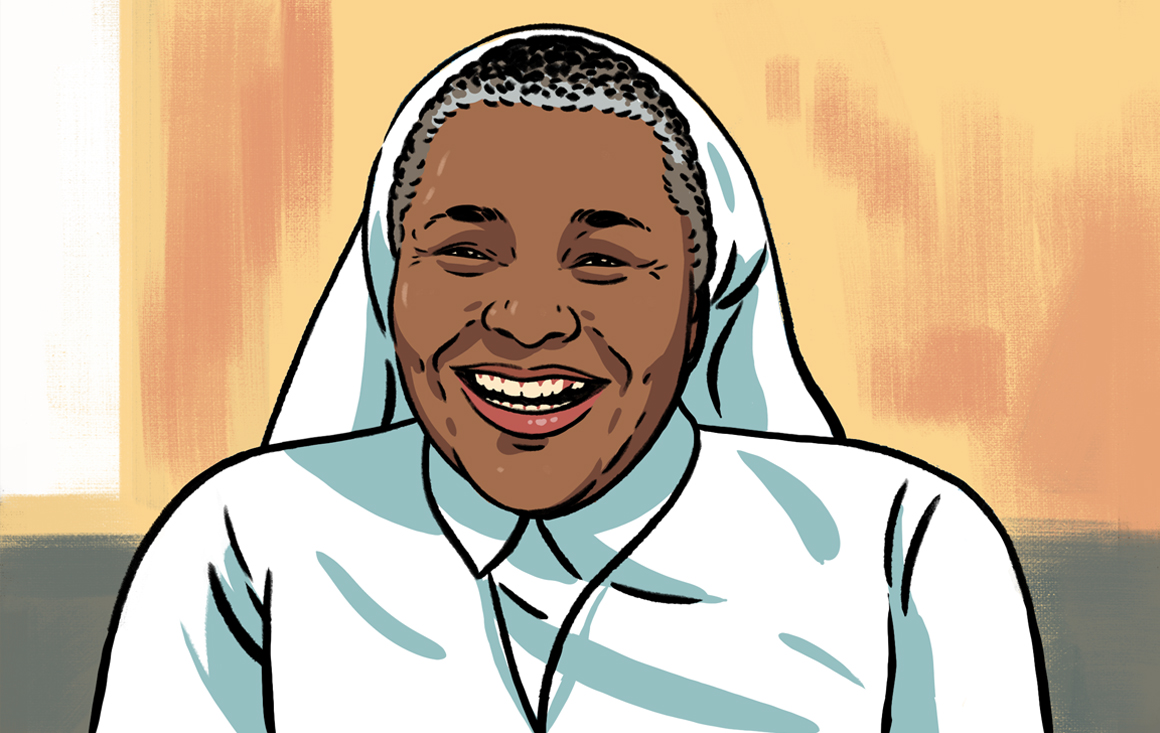Working to Give Others Life

In many areas of Nigeria, it’s not federal law that dictates the rights of women. Instead, matters of human rights decided by the Supreme Court of Nigeria in decades past are often ignored by cultural and traditional leaders at the local level, leaving women to fight for their humanity against outdated traditions.
Sister Francisca Ngozi Uti, HHCJ, founder and executive director of Centre for Women Studies and Intervention (CWSI) makes sure these women aren’t fighting alone. Founded 25 years ago as an initiative of the Congregation of the Handmaids of the Holy Child Jesus, CWSI has worked to improve women’s lives in Nigeria by dismantling harmful cultural and traditional practices from the ground up.
Sr. Ngozi’s team at CWSI is small but resourceful. Totaling 16 women over a central office in Abuja, Nigeria, and regional offices in four states, CWSI’s work is multifaceted, ranging from legal advocacy and negotiating with traditional leaders to opening pathways for women to pursue education and even political careers.
“Our work is not giving handouts to the poor,” Sr. Ngozi says. “It’s about empowering women so that more women are at the table where decisions are made.”
Last spring, Sr. Ngozi and CSWI were announced as finalists for the Opus Prize, which will be hosted at Santa Clara University Nov. 11-15. The winner will receive a $1 million prize and the two other finalists will receive $100,000 each.
“The Opus Prize Foundation and Santa Clara University have helped expose our work and make it more visible,” Sr. Ngozi says. “People want to know more about what we are doing. So in that case we want to expand.”
Education as a path to leadership
When Sr. Ngozi says she was born into her work, she means it quite literally. The third daughter in her family, she says her mother’s pregnancy was initially a source of distress.
Her father was the only son in his family of origin and in order to continue his family name, he needed to have male children. After his wife gave birth to two daughters, his extended family warned that if the third child wasn’t a male, his wife would have to go back to her family.
But when his third daughter was born, her father made his feelings clear by naming her Ngozichukwuka, or “God’s blessings are greater.”
“My father said, I am a blessing to him,” Sr. Ngozi says.
Growing up, Sr. Ngozi saw the dehumanizing impact of male child preference play out in her community. While her father paid for her two elder sisters and her to go to school, most other young women her age went without because paying for a woman’s education was considered by some to be a waste of money.
For Sr. Ngozi, education was a path to leadership. In primary and secondary schools, she was taught by the sisters of the congregation of Our Lady of Apostles. She worked as a civil servant for two years after graduation. Later, she met a group of sisters on a trip and found herself admiring them. When she returned, she reconnected with the Sisters of Our Lady of Apostles to ask what it took to be a religious. She joined the Congregation of the Handmaids of the Holy Child Jesus in 1974 and made her first profession of vows in 1977.
Sr. Ngozi continued her education as a religious, earning her bachelor’s degree in institutional management and eventually an MBA and Ph.D. in women and gender studies. In 1998, Sr. Ngozi found what she calls a “torch of inspiration.” Frustrated by the challenges she faced as a woman in the church, she wanted to work toward greater equality. Her goal was not to become a priest herself, which is how some might define equality, but instead to push back on the patriarchy she observed during the time she worked as a lecturer and bursar at the Saints Peter and Paul Major Seminary.
CWSI initially focused on the challenges faced by religious women before expanding its efforts to help women in Nigeria. Today, Sr. Ngozi and her staff travel to different states to teach young women about their rights. She also speaks to mothers and fathers to explain that without an education, women have limited options.
Fighting hundreds of years of tradition can be difficult, so CWSI’s work takes many forms. While education is perhaps the best long-term solution, many traditional practices require more immediate legal advocacy and intervention by the sisters. Despite federal laws, Nigeria ranks among the worst in the world for female genital mutilation and underage marriage, according to UNICEF. Other traditional practices can limit women’s inheritance rights or the financial responsibilities of fathers to children, which unduly burdens mothers and can create a poverty cycle.
Approaching these situations is difficult, Ngozi says. Each community is unique and you must find out who makes decisions in the area and how those decisions are made. Sometimes it requires challenging traditional leaders to examine the origin behind the tradition. Other times they turn influential young men from skeptics into advocates by educating them on the negative impact of these policies. The outcomes don’t always match the work put in, but Sr. Ngozi and her colleagues never give up.
“If you go to most communities and tell them you are coming to talk about equality or ending traditional practices, nobody will listen to you,” Sr. Ngozi says. “You have to go through it gradually, get them to understand, get them to see reason with you, get them to know why it is important.”
Walking beside, not behind
In her early days as a religious, Sr. Ngozi remembers hearing a quote by Mother Mary Charles Magdalen Walker, RSC, the foundress of her Congregation: “When you walk beside the man, you are collaborators,” Sr. Ngozi recalls. “But if you walk behind a man, one is superior and the other is inferior.”
Looking at CWSI’s 25-year history, Sr. Ngozi sees the start of a generation of women walking beside, not behind, men. On the regional and national level, more women are entering politics. In 2021, one state where CWSI worked had 21 women working in local government as vice chairmen. On the national level, there are now four women senators in parliament, some with affiliations with CWSI.
“We’ve tried to eliminate the stereotypes against women in politics,” Sr. Ngozi says. “You now find women who are bold enough to say, ‘I want to be a member of Parliament.’”
But even in success, more work needs to be done. “Four senators is only 3%,” she says. “But if you think of where you're coming from—zero—you know that 3% is something. If you persist at that, 3% can take you to bigger things.”
Those bigger things could come through the Opus Prize. Sr. Ngozi sees a future of expansion for CWSI including a new office and research center in Abuja. The work done by CWSI has grown past storytelling, she says, and they need to publish research.
On a more day-to-day level, she needs funds to offer direct assistance to women. Sr. Ngozi often encounters women who are trying to send daughters to school but are just a few dollars short of the tuition. She wants to be able to help those women directly. After all, they are what her work is about.
When times get difficult, Sr. Ngozi is reminded of these women, in particular a Bible passage that helps her center her work: John 10:10, “I have come that they may have life, and have it to the full.”
“This work is not about me,” Sr. Ngozi says. “I’m not from all the states where we work. I’m not a married woman, so no man is going to oppress me about inheritance. I don’t have daughters to educate. People sometimes tell me I’m wasting my energy and time to educate these girls, but it is just to make sure that others have life.”
The Opus Prize is an annual award recognizing organizations who champion faith-filled change. The Opus Prize is given not only to expand the humanitarian efforts of the recipient, but to inspire others to pursue lives of service. The combined awards make up one of the world's largest faith-based awards for social entrepreneurship. Santa Clara will host the Opus Prize event Nov. 11-15.


